Key takeaways:
- Parenting classes provide valuable networking opportunities, fostering a supportive community among parents facing similar challenges.
- Effective communication techniques, such as active listening and using open-ended questions, significantly enhance parent-child interactions.
- Building emotional intelligence in children through recognition of feelings can lead to better emotional resilience and empathy.
- Consistency in parenting approaches strengthens family relationships and provides a stable foundation for children’s future social interactions.
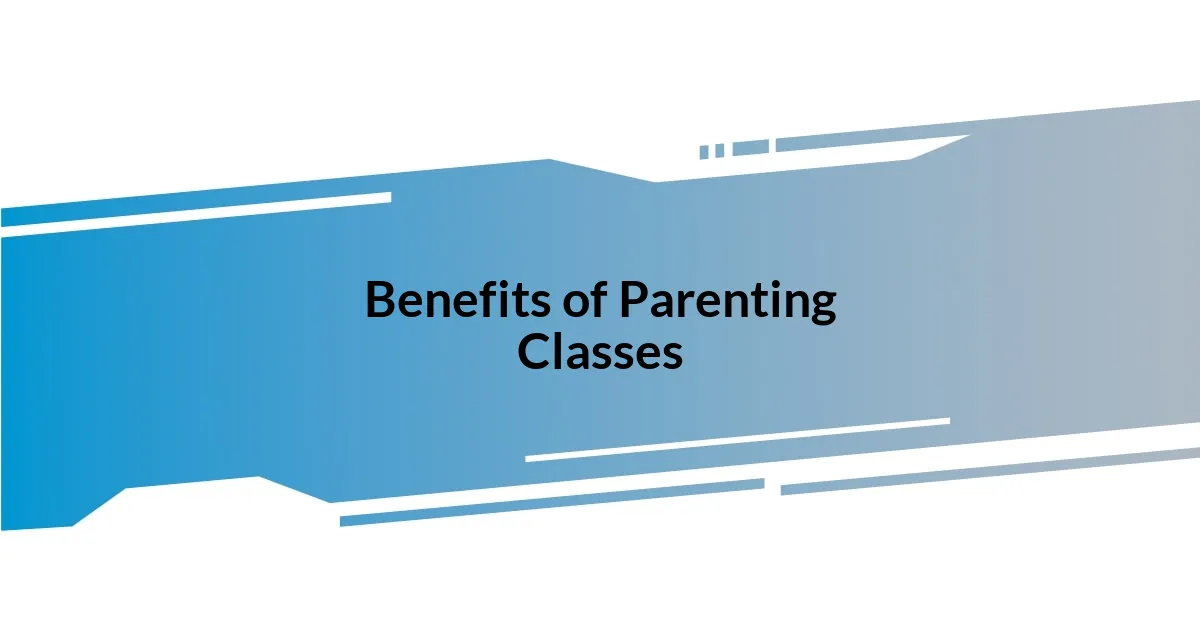
Benefits of Parenting Classes
Attending parenting classes truly opened my eyes to the nuances of child development. I remember an exercise where we had to role-play different parenting styles. It made me realize how vital my approach could be in shaping my child’s character. Isn’t it fascinating how a simple change in response can alter a child’s perception of their world?
One major benefit I discovered was the networking opportunities with other parents. I found comfort in sharing experiences with others who were navigating similar challenges. Forming this supportive community gave me a sense of belonging and uplifted my confidence. Have you ever felt overwhelmed and just needed someone to say, “You’re not alone”? That connection gave me the reassurance I craved.
Moreover, the classes provided practical strategies for managing tough behaviors and fostering positive communication. I remember one session focusing on active listening techniques. It was a game-changer for me. I started applying those skills immediately, and the difference in my conversations with my child was remarkable. Who doesn’t want to feel heard and valued, even at a young age?

Key Topics Covered in Classes
The parenting classes covered a range of topics that significantly enriched my understanding of childrearing. One session that stood out to me was about emotional intelligence, where we learned how to help our children identify and express their feelings. I recall vividly a discussion about why validating a child’s emotions can prevent meltdowns and foster resilience. It struck me how simply acknowledging my child’s sadness could transform a tense situation into an opportunity for connection.
Some key topics often included in parenting classes are:
- Child Development Stages: Understanding what to expect at each age can guide your parenting approach.
- Effective Discipline Strategies: Techniques like positive reinforcement can reshape behavior positively.
- Communication Skills: Learning how to talk to kids and understanding their language is crucial.
- Building Self-Esteem: During one session, we practiced methods to encourage our children’s confidence and autonomy.
- Conflict Resolution: We explored ways to handle disagreements in a constructive manner, modeling healthy problem-solving for our kids.
I found these discussions immensely helpful. They not only provided me with tools but also helped me reflect on how my upbringing influenced my parenting style. It was a reminder that every little interaction holds the power to build or break our child’s spirit.
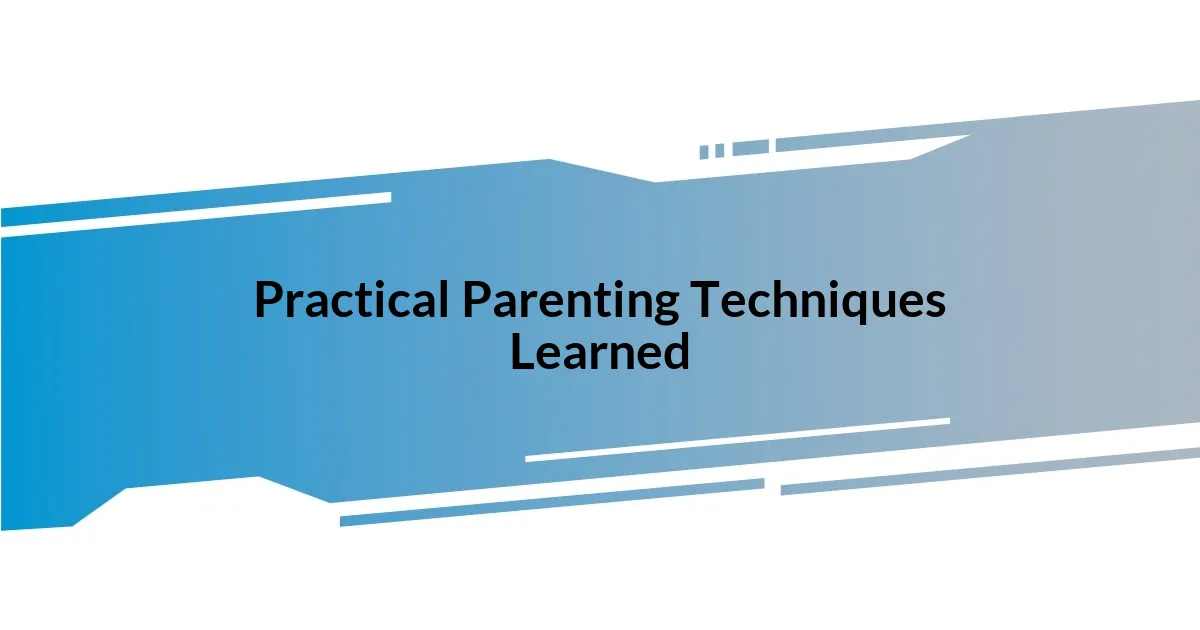
Practical Parenting Techniques Learned
One practical technique that really resonated with me was the concept of “I-statements” during communication. Instead of saying, “You always ignore me,” I learned to phrase it as, “I feel sad when I don’t get your attention.” This shift not only reduced defensiveness but also paved the way for more productive conversations with my child. Have you ever noticed how changing your words can change the entire tone of a discussion? It’s honestly remarkable.
Another invaluable lesson came from understanding behavior management through positive reinforcement. During one class, we practiced acknowledging small achievements to motivate our kids. I started implementing this at home, rewarding my son with praise every time he completed his chores. The sparkle in his eyes when he heard, “I’m so proud of you!” was priceless. It made me realize that small victories can nurture a child’s drive towards responsibility.
Finally, we delved into the importance of routines and structure. Establishing a consistent schedule helped my family feel secure and allowed my child to thrive. I remember vividly how our bedtime routine not only made those evenings calmer but also became a cherished time for bonding. Isn’t it heartwarming to witness how simple strategies can create deeper connections with our children?
| Techniques | Descriptions |
|---|---|
| I-Statements | A method to express feelings without blaming, fostering open dialogue. |
| Positive Reinforcement | Acknowledging achievements to encourage desired behaviors. |
| Establishing Routines | Creating a structured environment for security and bonding. |
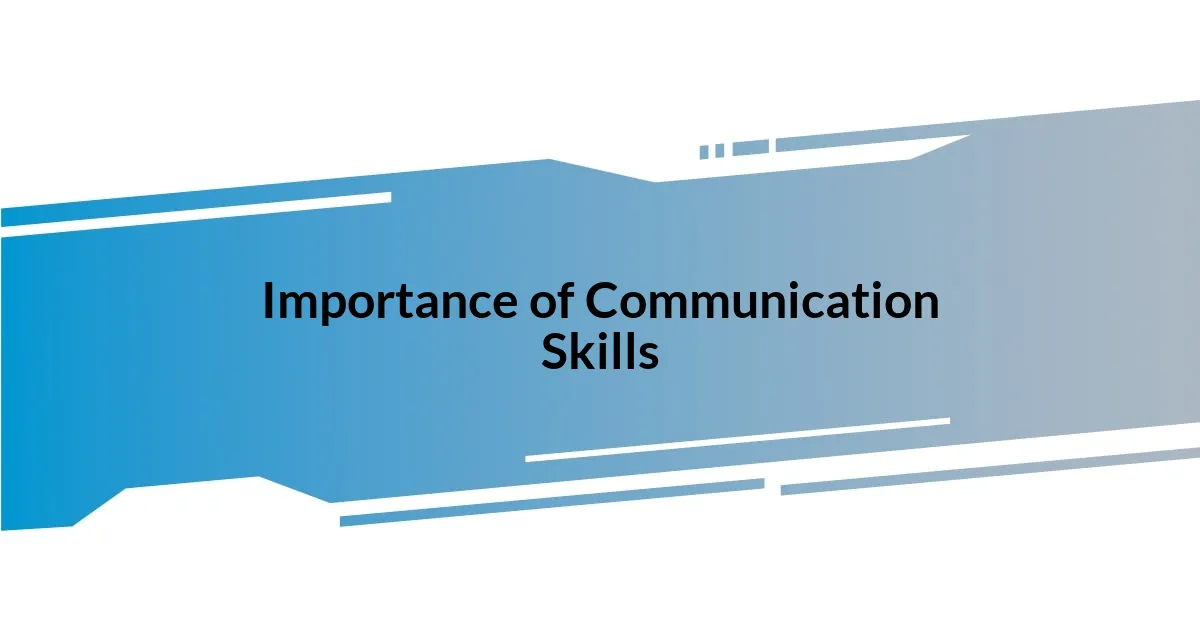
Importance of Communication Skills
Communication skills are absolutely vital in parenting. I can’t emphasize enough how I learned to adapt my language to fit my child’s perspective. One of those lightbulb moments for me happened during a class exercise where we practiced conveying emotions clearly. I remember telling my daughter, “I feel frustrated when the toys are scattered everywhere.” It was a gentle way to guide her understanding without blaming, and I could see her processing my feelings instead of just perceiving it as criticism.
I’ve also become acutely aware of the power of listening. Isn’t it fascinating how often we hear what we want to hear rather than actually tuning into our kids? During one discussion, we were prompted to reflect on our listening habits. I realized that I often interjected my thoughts instead of giving my son room to express his ideas. Now, I’ve made it a point to pause and really listen. What I’ve discovered is that validating his thoughts has not only deepened our connection but also encouraged him to share more openly.
Furthermore, the practice of using open-ended questions has been transformative for me. Instead of asking, “Did you like school today?” which often leads to a one-word answer, I now ask, “What was your favorite part of today?” This small change has opened up rich conversations between us. I cherish those moments when he eagerly shares stories, and it’s rewarding to see his excitement and engagement. Have you tried transforming your questions, too? It’s incredible how communication evolves when we approach it with intention.
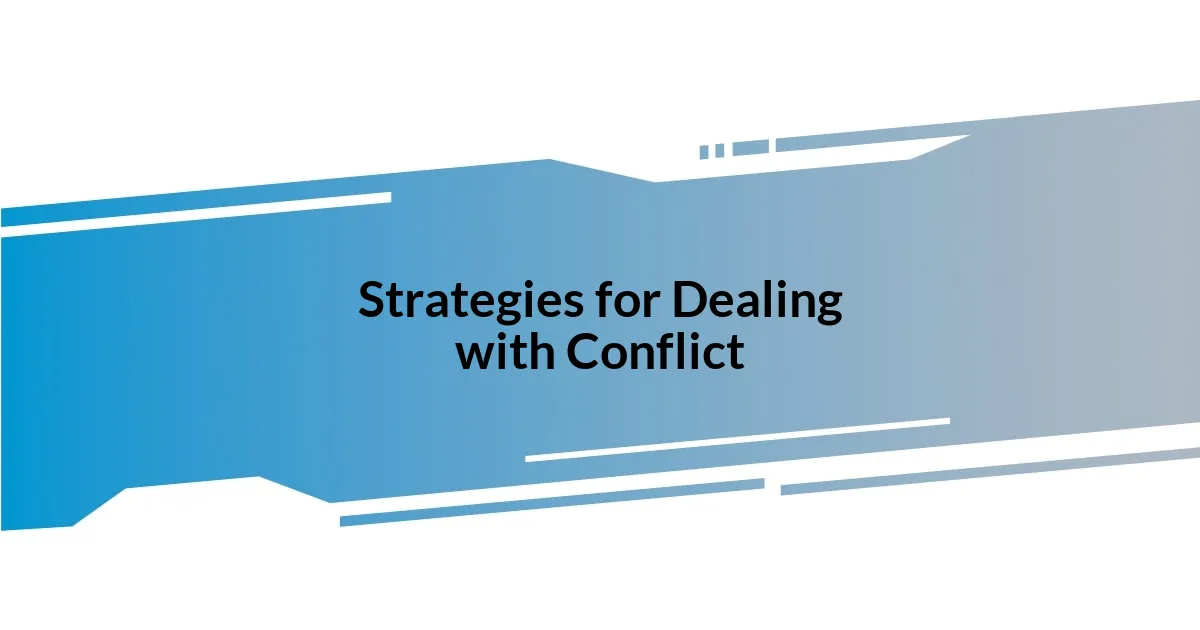
Strategies for Dealing with Conflict
When it comes to handling conflict, one of the most effective strategies I’ve learned is the art of active listening. I remember a particularly tense moment when my daughter was upset over a disagreement with her friend. Instead of jumping in with my own perspective, I simply listened to her feelings without interrupting. By doing this, I not only validated her emotions, but she also felt heard, which diffused the situation significantly. Have you ever noticed how powerful it is to just let someone talk?
Another approach that has worked wonders for me is to establish a calm-down timeout—not just for my child, but for me, too! In moments of heightened emotions, I’ve discovered that stepping away for a few minutes has allowed us both to gather our thoughts before addressing the issue. I vividly recall a time when my son and I had a heated disagreement over chores. Taking a breather helped me return with a clearer mindset, enabling us to talk through our feelings constructively. Doesn’t it feel great to cool down before reacting?
Finally, I’ve embraced the power of collaboration in conflict resolution. When my son feels wronged, I invite him to brainstorm solutions with me. Once, he felt unjustly treated when I said he couldn’t play video games. Instead of simply enforcing my decision, we sat down together to discuss fair game time. Not only did it lead to a compromise, but it also empowered him to take an active role in decision-making. It was a revelation to me how involving him in problem-solving fosters both understanding and respect. How often do we overlook the chance to work together in resolving conflicts?
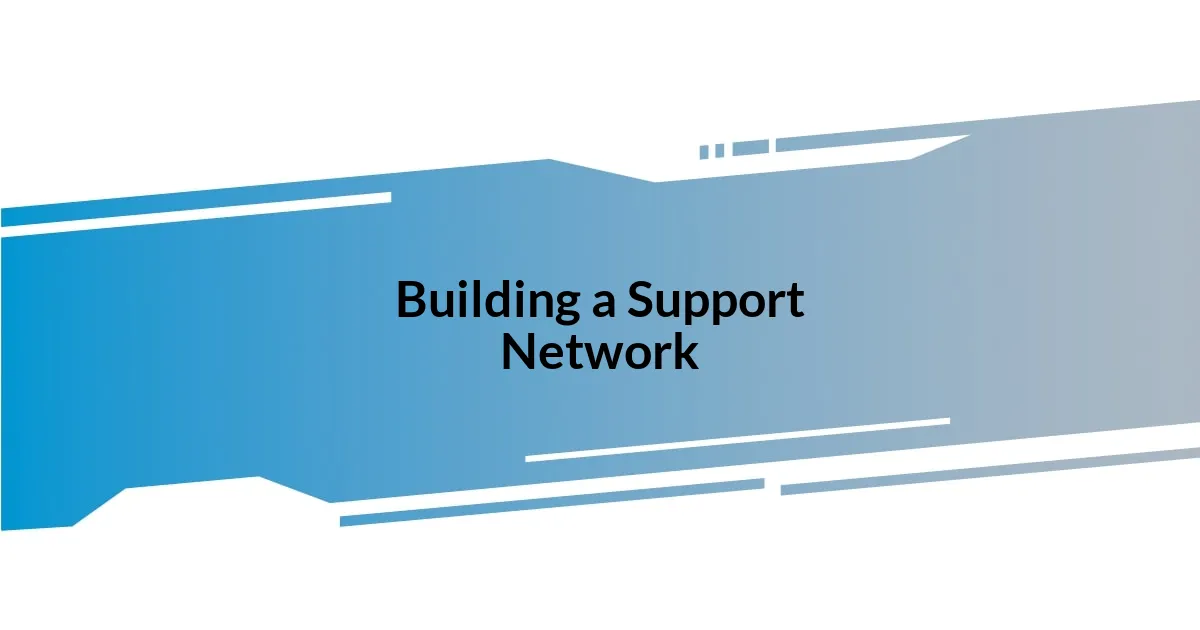
Building a Support Network
Building a support network has been one of the most rewarding discoveries for me through parenting classes. It became clear that connecting with other parents not only alleviated my sense of isolation but also created a space where we could share experiences, tips, and even laugh about the challenges we faced. During a class group, I remember sharing a particularly chaotic morning getting the kids ready, and suddenly, the room erupted with laughter as others chimed in with their own morning mishaps. It felt like an instant bond, and I realized how comforting it is to know I’m not alone in this parenting journey. Have you ever found solace in simply being understood?
Fostering those connections has led to some productive friendships that extend beyond the classroom. I reached out to a fellow parent, and we started a weekly coffee meet-up, where we discuss our challenges and victories. It’s an outlet that benefits us both; I often walk away with fresh perspectives and actionable advice I can apply immediately. Who knew sharing a cup of coffee could turn into a mini-support group? I genuinely cherish those moments, as they have become a vital component of my parenting toolkit.
Moreover, I’ve learned that nurturing these relationships goes beyond just casual meet-ups. For instance, we’ve organized playdates for our kids, creating a supportive atmosphere for them to bond while we share our thoughts and strategies in real-time. Not long ago, one of our playdates turned into a heartfelt discussion about discipline techniques, during which I picked up some incredibly useful tips that I’ve started implementing. Isn’t it fascinating how a simple gathering can lead to such insightful exchanges? Building a support network not only enriches our parenting journey but also reminds us of the power of community in overcoming challenges together.
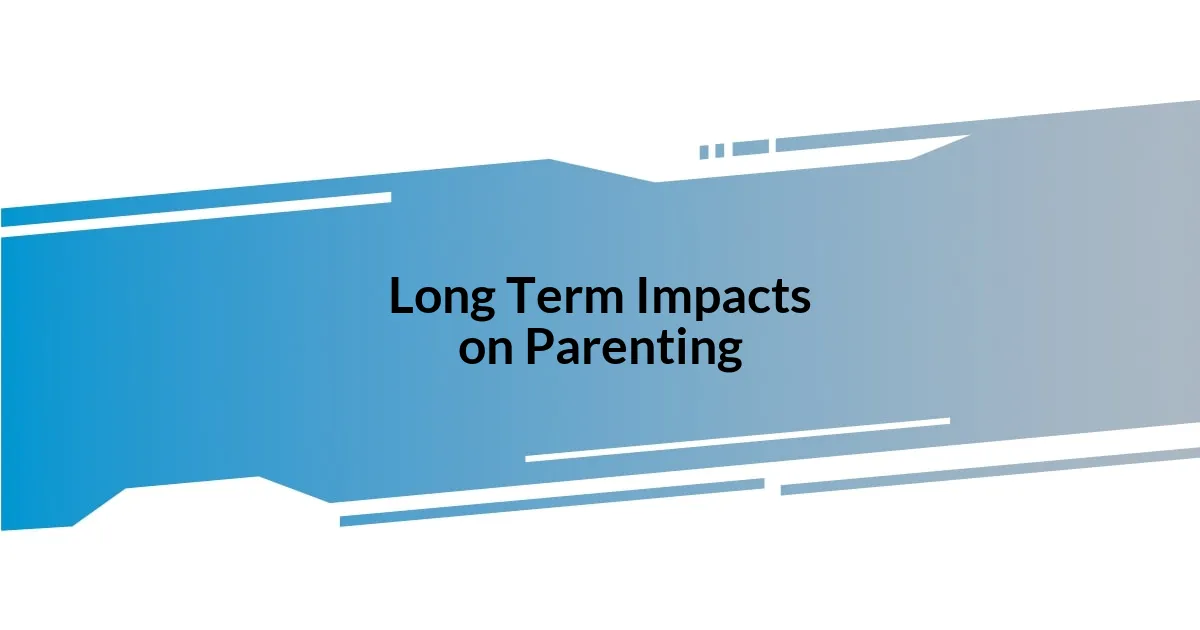
Long Term Impacts on Parenting
As I reflect on the long-term impacts of parenting, I can’t help but think about the emotional resilience I’ve cultivated. For instance, after learning about the importance of emotional intelligence in parenting classes, I started to label emotions during challenging moments. I remember one evening when my son was throwing a tantrum, and instead of reacting, I calmly said, “I see you’re feeling really frustrated right now.” This simple acknowledgment seemed to shift his focus, and I began to realize that teaching him to name his emotions would serve him well throughout his life. Doesn’t it make sense that understanding our feelings shapes how we respond to life’s ups and downs?
Nurturing these skills extends beyond our immediate interactions. My partner and I have noticed that our children have become more empathetic over time, which I attribute to our focus on teaching kindness and respect. I distinctly recall a moment when my daughter comforted a friend who was feeling left out, and it struck me how much she’d absorbed from our discussions on empathy. It’s moments like these that provide a glimpse into the future — our children are not only building their social skills but are also learning the value of compassion, which I see as a lasting legacy. How rewarding is it to witness your child embody the values you’ve tried to instill?
Additionally, my experiences in parenting classes have underscored the significance of consistency in our parenting approaches. Whenever I face a parenting challenge, I now ask myself if I’m being consistent with our family values. For instance, during a phase where my son was testing boundaries, it became crucial for us to remain united in our responses to his behavior. The realization that this consistency helps him understand expectations has been eye-opening. It’s fascinating how a united front not only strengthens our relationship but also lays a solid foundation for his future relationships. Isn’t it incredible how the way we navigate these early years can echo throughout their entire lives?